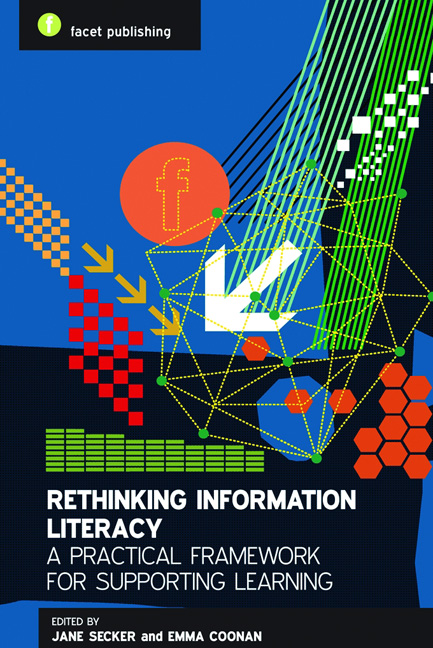Book contents
- Frontmatter
- Contents
- Acknowledgements
- Contributor profiles
- Introduction
- Strand One Transition from school to higher education
- Strand Two Becoming an independent learner
- Strand Three Developing academic literacies
- Strand Four Mapping and evaluating the information landscape
- Strand Five Resource discovery in your discipline
- Strand Six Managing information
- Strand Seven The ethical dimension of information
- Strand Eight Presenting and communicating knowledge
- Strand Nine Synthesizing information and creating new knowledge
- Strand Ten The social dimension of information
- Afterword: ‘Ownership is a flawed concept’
- Conclusion
- Appendix 1 A New Curriculum for Information Literacy (ANCIL): the curriculum
- Appendix 2 ANCIL Lesson Plan
- Appendix 3 ANCIL Institutional Audit: worksheet
- Appendix 4 ANCIL Institutional Audit: interview questions
- Index
- Miscellaneous Endmatter
- Miscellaneous Endmatter
- Miscellaneous Endmatter
- Miscellaneous Endmatter
Strand Six - Managing information
Published online by Cambridge University Press: 08 June 2018
- Frontmatter
- Contents
- Acknowledgements
- Contributor profiles
- Introduction
- Strand One Transition from school to higher education
- Strand Two Becoming an independent learner
- Strand Three Developing academic literacies
- Strand Four Mapping and evaluating the information landscape
- Strand Five Resource discovery in your discipline
- Strand Six Managing information
- Strand Seven The ethical dimension of information
- Strand Eight Presenting and communicating knowledge
- Strand Nine Synthesizing information and creating new knowledge
- Strand Ten The social dimension of information
- Afterword: ‘Ownership is a flawed concept’
- Conclusion
- Appendix 1 A New Curriculum for Information Literacy (ANCIL): the curriculum
- Appendix 2 ANCIL Lesson Plan
- Appendix 3 ANCIL Institutional Audit: worksheet
- Appendix 4 ANCIL Institutional Audit: interview questions
- Index
- Miscellaneous Endmatter
- Miscellaneous Endmatter
- Miscellaneous Endmatter
- Miscellaneous Endmatter
Summary
Strand Six includes a range of key functional skills such as time management and planning, effective information storage and retrieval, reference management and staying up to date. Without these skills students will struggle to manage and process academic information efficiently. While the practical element of these skills is taught widely, it is important to emphasize that there is a cognitive aspect inherent in each which links the daily practices of study and research directly to the learner's developing identity. It is therefore vital to give students the opportunity to reflect on how they will integrate these skills into their own practices and workflow, and to review their practices from time to time.
Many digital tools are available to support and simplify these aspects of information management, and trainers are free to select and teach the tools they feel are most appropriate for a particular cohort at a given time. We have not stipulated particular tools to teach, firstly since technology is moving at too fast a pace, and secondly in order to emphasize that understanding the underlying study and research needs is of greater importance than learning to use specific tools or programs to aid these processes.
As the Librarian at the Faculty of English at the University of Cambridge, Elizabeth has been teaching information literacy in a way that underpins many of the ANCIL principles. She was part of the expert consultation carried out as part of the ANCIL research and her thinking helped shape ideas about how the curriculum should be taught. Her approach to teaching students how to manage information, by using Zotero to engage them and provide the ‘wow’ factor, is a useful example of good practice in one of the key strands in any information literacy teaching.
Institutional context
The Faculty of English at the University of Cambridge is one of many faculties and departments which are organized loosely into schools; English is within the Arts and Humanities School. The majority of the faculties within this school have large, currently independently run, faculty libraries. Our priority at the English Faculty Library (EFL) in terms of collection development is with the undergraduate body, which comprises approximately 700 students. The largely taught MPhil programme at the faculty is active and increasingly an important aspect of provision, and as a result the library finds itself in the position of supporting this group as well.
- Type
- Chapter
- Information
- Rethinking Information LiteracyA practical framework for supporting learning, pp. 67 - 78Publisher: FacetPrint publication year: 2012



